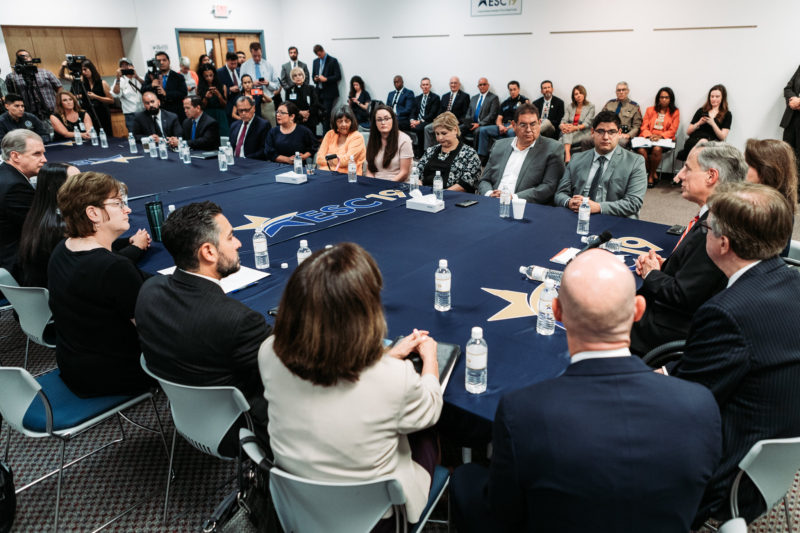Governor Greg Abbott is expected to release a report this week on the two roundtables held recently in El Paso and Austin in the aftermath of a mass shooting that left 22 dead in El Paso.
The roundtables were convened before a second mass shooting in Midland/Odessa, which left another eight dead, including the shooter.
Participants included security experts, mental health experts, representatives of social media companies, gun control advocates, gun rights advocates, and the delegation of state lawmakers from El Paso.
Topics included how the state can support communities recovering from the recent violence, monitoring for and reporting threats made on social media, as well as what might be done to prevent would-be killers from gaining access to firearms.
Abbott’s report on the roundtables is likely to be taken up by House and Senate Select Committees formed last week with directives to study mass violence prevention and consider legislative action.
The governor’s office stated in a press release last Thursday, “To further advance solutions and jumpstart legislative action, Governor Abbott will be releasing a report of findings and recommendations from the Texas Safety Commission meetings next week.”
The governor also on Thursday issued eight executive orders, most directed at the Department of Public Safety, that he said were aimed at preventing further mass shootings. He called the orders a “starting point in the process to keep Texas communities safe.”
The first order requires the Texas Department of Public Safety to develop within 30 days “standardized intake questions” that can be used by law enforcement agencies contacted by persons who may have information about the threat of a mass shooting.
The second order requires the Department to develop guidance for when and how Texas law enforcement agencies should submit “Suspicious Activity Reports” to the Texas Suspicious Activity Reporting Network, and the third order requires the development of training materials relating to the first two orders.
The governor’s press office explained that these orders were conceived in part because of contacts made to law enforcement prior to the mass shootings in El Paso and Odessa. In the case of the El Paso gunman, the shooter’s mother had called law enforcement to express concerns about her son. And in Odessa, both the killer himself and his employer had called law enforcement prior to the shooting spree.
Abbott also directed the Department of Public Safety to create and conduct a public awareness campaign about how they can report suspicious activity to law-enforcement agencies to identify potential mass shooters or terroristic threats.
Texas already has law enforcement threat centers referred to as “fusion centers.” Abbott has ordered that these fusion centers be reinforced with additional personnel from the Department of Public Safety and his own office, “for the purpose of better collecting and responding to Suspicious Activity Reports, and better monitoring and analyzing social media and other online forums, for potential threats.”
However, in his statement, Abbott acknowledged that marshaling law enforcement resources alone might not be sufficient to stop future mass murders. “While these executive orders will enhance law enforcement’s ability to respond and prevent these shootings, legislative solutions are still needed… I will continue to work expeditiously with the legislature on laws to keep guns out of the hands of dangerous criminals, while safeguarding the 2nd Amendment rights of law-abiding Texans.”
Dozens of Democratic lawmakers have criticized Abbott for not acting swiftly or decisively enough in the wake of the mass shootings. They are calling on him to call a special session of the legislature to change gun laws.
Related coverage:
